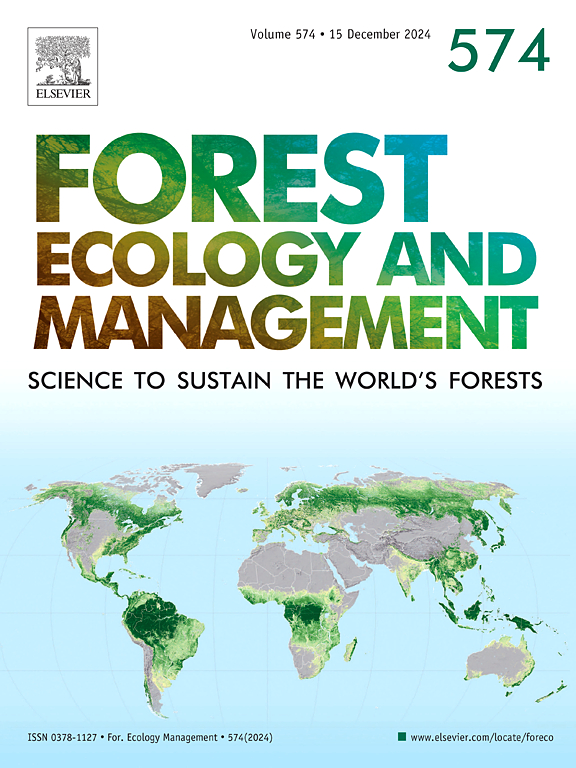Making the most of native seeds: Management techniques interact with seed and seedling traits for enhancing direct seeding success
IF 3.7
2区 农林科学
Q1 FORESTRY
引用次数: 0
Abstract
Direct seeding offers a cost-effective approach to large-scale restoration, but seedling establishment can vary greatly across species and regions. This study investigates how management techniques used for seed processing, site preparation, seeding, and post-seeding management interact with seed/seedling traits and influence direct seeding success. We conducted a systematic review of Brazilian direct seeding research, encompassing 26 % of global studies. We focused on paired experiments comparing management techniques against control treatments to analyze seedling establishment rates for trees, shrubs, and palms. The techniques included pre-soaking seeds, overcoming seed dormancy, seed burial, mulch application, soil fertilization, intercropping with green manure or agricultural crops, weed control, and sowing in the shade of secondary vegetation. Seed traits were fresh mass, water content, and shape, and seedling traits were functional morphology, successional guild, and vegetation guild, i.e., forest or savanna. Pre-germination treatments offered no significant benefit. Seed burial doubled establishment, and mulch application only aided unburied seeds. Organic fertilization reduced establishment for savanna species, while intercropping with green manure or crops enhanced establishment for forest species. Weed control effectiveness depended on functional traits. Mowing favored pioneers, while hoeing or herbicide application benefited large-seeded and epigeal-foliaceous-cotyledon seedlings. Pioneer species establishment was 15 % in full sun and 3 % in the shade, while shade-tolerant climax species established at 8 % in full sun and 28 % in the shade. By implementing management techniques, direct seeding success can be increased up to fourfold. This translates to a potential reduction in seed usage, the primary cost of direct seeding, by 25–75 %. These findings pave the way for cost-effective restoration efforts with improved seedling establishment rates.
充分利用本地种子:管理技术与种子和幼苗特性相互作用,提高直接播种的成功率
直接播种为大规模恢复提供了一种具有成本效益的方法,但不同物种和地区的幼苗成活率会有很大差异。本研究调查了种子处理、场地准备、播种和播种后管理等方面的管理技术如何与种子/幼苗性状相互作用,并影响直播的成功率。我们对巴西的直播研究进行了系统回顾,涵盖了全球 26% 的研究。我们将重点放在对比管理技术与对照处理的配对实验上,以分析乔木、灌木和棕榈树的成苗率。这些技术包括预浸种、克服种子休眠、埋种、覆盖、土壤施肥、与绿肥或农作物间作、杂草控制以及在次生植被遮荫处播种。种子性状包括鲜重、含水量和形状,幼苗性状包括功能形态、演替区系和植被区系,即森林或热带草原。发芽前处理无明显益处。种子埋藏可使种子成活率提高一倍,而覆盖物的应用仅对未埋藏的种子有帮助。有机施肥降低了热带稀树草原物种的成活率,而间作绿肥或农作物则提高了森林物种的成活率。杂草控制效果取决于功能特征。刈割有利于先锋树种,而锄草或施用除草剂则有利于大粒种子和外胚叶子叶幼苗。先锋树种在全日照下的成活率为 15%,在阴凉处的成活率为 3%,而耐阴的高潮树种在全日照下的成活率为 8%,在阴凉处的成活率为 28%。通过实施管理技术,直接播种的成功率可提高四倍。这意味着种子用量(直播的主要成本)有可能减少 25-75%。这些发现为提高秧苗成活率、开展具有成本效益的恢复工作铺平了道路。
本文章由计算机程序翻译,如有差异,请以英文原文为准。
求助全文
约1分钟内获得全文
求助全文
来源期刊

Forest Ecology and Management
农林科学-林学
CiteScore
7.50
自引率
10.80%
发文量
665
审稿时长
39 days
期刊介绍:
Forest Ecology and Management publishes scientific articles linking forest ecology with forest management, focusing on the application of biological, ecological and social knowledge to the management and conservation of plantations and natural forests. The scope of the journal includes all forest ecosystems of the world.
A peer-review process ensures the quality and international interest of the manuscripts accepted for publication. The journal encourages communication between scientists in disparate fields who share a common interest in ecology and forest management, bridging the gap between research workers and forest managers.
We encourage submission of papers that will have the strongest interest and value to the Journal''s international readership. Some key features of papers with strong interest include:
1. Clear connections between the ecology and management of forests;
2. Novel ideas or approaches to important challenges in forest ecology and management;
3. Studies that address a population of interest beyond the scale of single research sites, Three key points in the design of forest experiments, Forest Ecology and Management 255 (2008) 2022-2023);
4. Review Articles on timely, important topics. Authors are welcome to contact one of the editors to discuss the suitability of a potential review manuscript.
The Journal encourages proposals for special issues examining important areas of forest ecology and management. Potential guest editors should contact any of the Editors to begin discussions about topics, potential papers, and other details.
 求助内容:
求助内容: 应助结果提醒方式:
应助结果提醒方式:


